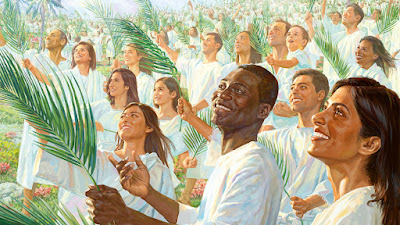THE SAINTS NEXT-DOOR.
November 1, 2021
Solemnity of All Saints.
READINGS: Rv 7:2-4, 9-14; Ps 24:1bc-2, 3-4ab, 5-6; 1 Jn3:1-3; Mt 5:1-12a.
“Rejoice and be glad, for your reward will be great in
heaven.” (Mt 5:12a)
A Hebrew proverb says: “Whoever has not tasted sinfulness
does not qualify for holiness.” And an Italian proverb adds: “All saints do not
work miracles.”
Communion and fellowship with the Saints is one of the
articles of our Catholic faith. We profess in the Creed that we believe in the
Communion of Saints. From there, the Saints become our daily companions of
life.
In the liturgical calendar, every single day has its
mentioned saint. So, the whole year, one after another, plenty of known saints
are namely commemorated. The Saints, however, are more than those we recall in
one year. And not only so, but many other saints are also unknown. Today's
feast celebrates all those unknown saints who, we believe, are now in Heaven.
Holiness is within everyone's reach. Through the Communion of the Saints, each
part of the Mystical Body of Christ that is the Church helps every other to
grow towards holiness.
The solemnity of the All Saints teaches us two great
lessons: that holiness is our common vocation and at reach, and that Saints are
our next-door's neighbors.
The Saints Next-door is an expression borrowed from Pope
Francis in his Apostolic Exhortation, entitled “Gaudete et exsultate” (Rejoice
and be glad). It speaks of the call for universal holiness. Francis praises
parents who raise children with “immense love” and who work hard to support
their families, and he concludes, “Very often it is a holiness found in our
next-door neighbors, those who, living in our midst, reflect God’s presence.”
He calls such folks: “the middle class of holiness”
Holiness is a reflection or replication of God's presence
and love in our daily existence. As such, holiness is to be pursued in every
single gesture, action, word that one puts every day. It is to live thirsting
for trinitarian perfection, though holiness is not a search for perfectionism.
The Catechist says: “This perfect life with the Most Holy Trinity - this
communion of life and love with the Trinity, with the Virgin Mary, the angels
and all the blessed - is called "heaven." Heaven is the ultimate end
and fulfillment of the deepest human longings, the state of supreme, definitive
happiness.” CCC 1024.
In today’s liturgy, the first reading raises the point on
the universality of holiness. The Apostle John, in his vision, says to have
seen a huge number, impossible to count, of people from every nation, race,
tribe, and language. It is clear that the flock of Saints is huge, but not only
is it huge, but God also makes no discrimination. All are called and welcomed
to the banquet of holiness. The salvation of Christ is opened to all.
Then, how can we become saints today? Here thus, the concept
of the Saints Next-door's gets its meaning. God wants us to be like him, to see
him face to face and be with him. That is why he created us. That is what we
are called for. Sainthood is our primary vocation, and holiness is at reach for
all. We are created in the image and likeness of God. We are also called to be
Christlike, to imitate Jesus' life in all we do. For, the Christian life is an
imitation of Christ and a ‘Sequela Christi’.
However, we can fully achieve that vocation and incarnate
Christ only through a life of Beatitude. The Beatitudes are the vade-mecum of
perfect Christian life. They provide us with eight shortcuts to perfection and
sanctity. They are the eight attributes of the Kingdom of God and the perfect
summary of Jesus' life. The Lord is the first "Poor in Spirit",
expression of the continual need of God. The Lord is in those who mourn. The
Lord is the perfection of meekness. For he is gentle, lowly, humble. The Lord shines
in those who hunger and thirst for righteousness. He came to seek justice in
this world. The Lord is the perfection of mercy. The Lord is purity per
excellence. In him, there is no corruption, no fraud, no stain of sin. The Lord
is the greatest peacemaker. For that reason, he reconciles himself with the
sinners. The Lord is the first persecuted for the sake of righteousness.
Reading step by step the life of Jesus, we can only exclaim
that Jesus is the Beatitudes made flesh. As his followers, he teaches us the
way to perfection by inviting us to incarnate in our lives those Beatitudes. To
be a saint today is to walk that way of the Beatitudes. This, even though
demanding, is at reach for all. Sainthood is next to us.





Comments
Post a Comment